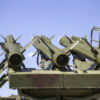In a rare move, United Nations Secretary-General Antonio Guterres has invoked Article 99 of the UN Charter to formally warn the Security Council about the global threat posed by Israel’s war on Gaza. The secretary-general has been urging for an immediate humanitarian ceasefire since October 18, but the Security Council has yet to adopt a resolution on the matter due to differences between permanent members. The United States, a strong supporter of Israel, has vetoed a resolution, while Russia, more critical of Israel, has blocked another one.
Article 99 of the UN Charter grants the secretary-general the power to call a meeting of the Security Council on his own initiative to issue warnings about new threats to international peace and security. It allows him to bring attention to matters that are not yet on the council’s agenda. This special power grants Guterres the right to speak at the Security Council without being invited by a member state, as is usually the case.
In a letter to the Security Council released on Wednesday, Guterres expressed his concern over the council’s lack of action and the dire situation in Gaza. He warned that the humanitarian system in Gaza is on the verge of collapse, with no effective protection for civilians and nowhere safe in the region. Guterres emphasized that the deteriorating situation could have irreversible implications for Palestinians and peace and security in the region.
The Security Council, as the UN’s most powerful body, has the authority to adopt a ceasefire resolution and take additional actions to ensure its implementation, such as imposing sanctions or authorizing the deployment of an international force. However, Guterres does not have the power to force the council to adopt a resolution due to the veto power held by China, Russia, the US, the UK, and France. The US, for example, vetoed a resolution on October 18 that condemned Hamas’s attack on Israel but called for a pause in the fighting to allow humanitarian assistance into Gaza. Twelve other council members voted in favor, while Russia and the UK abstained.
Article 99 has only been invoked four times in the past, serving as a preventative tool to deter conflicts from escalating. However, its use has also occurred after conflicts had already escalated, as in the war on Gaza. Its effectiveness in bringing peace has been mixed, as it does not fundamentally change the political calculations of the Security Council’s most powerful members.
In the current conflict, the US has firmly opposed a ceasefire resolution at the Security Council, and there is little indication of a change in Washington’s position. Israel’s ambassador to the UN, Gilad Erdan, criticized Guterres’s invocation of Article 99, accusing him of moral distortion and bias against Israel. Erdan referred to the secretary-general’s call for a ceasefire as a call to maintain Hamas’s reign of terror in Gaza and reiterated his call for Guterres to resign.
While the use of Article 99 serves as a significant warning and brings attention to the global threat posed by the Gaza conflict, its ultimate impact on achieving peace relies on the willingness of the Security Council’s most powerful members to take action.




